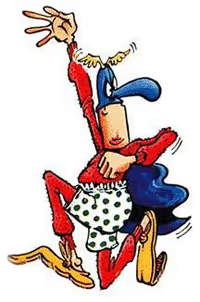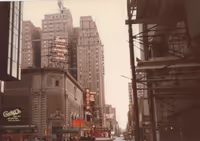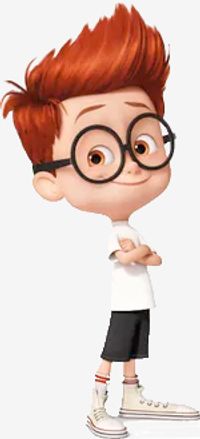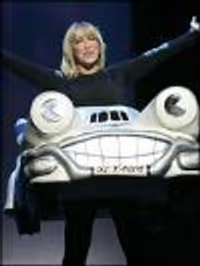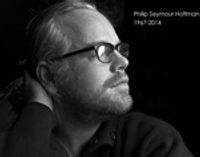Why did Bonnie & Clyde flop?
FindingNamo
Broadway Legend Joined: 7/22/03
#25Why did Bonnie & Clyde flop?
Posted: 3/5/16 at 12:33pm
So one show must die so another can open.
It's the circle... the circle of liiiiiiiiiiiiiiliife...
#26Why did Bonnie & Clyde flop?
Posted: 3/5/16 at 12:34pm
It flopped because they ruined it from La Jolla to Broadway. It wasn't a good show by the time it opened, but it was in La Jolla.
Same thing happened to Jekyll & Hyde. What wound up on Broadway was virtually unrecognizable compared to the Houston productions.
#27Why did Bonnie & Clyde flop?
Posted: 3/5/16 at 12:46pm
I'd like to add two more examples of musicals that were better in previews than on Broadway. Catch Me If You Can was wonderful in Seattle and 9 to 5 was equally wonderful in Los Angeles, but both were ruined by the time they made it to Broadway.
Valle6
Swing Joined: 12/28/15
#28Why did Bonnie & Clyde flop?
Posted: 3/5/16 at 6:58pm
It flopped because of Frank Wildhorne's Name. He is the one they are making fun of "In the song that goes like this" in Spamalot. He is known as the Poperetta King. And that's not a complement.
NY Theatre can be a popularity contest and unfortunately Wildhorne is not popullar. I am not a fan of his past scores but I felt Bonnie and Clyde was a very different animal and had a gorgeous score showing a lot of respect for the 20's period and was quite a good musical. Unfortunately, the shark critics had their bleeding fish in Wildhorne and they devoured it ...in this case unfairly. I thought it had a compelling book, good music and great performances.
It was done by Slow Burn Theatre in Fort Lauderdale and all the critics and audiences in the Fort Lauderdale area were surprised that this very well constructed musical flopped in New York.
Another reason it flopped is the producer. Jeffrey Richards is a very smart but pragmatic producer. Getting some really bad reviews, he didn't give the show a chance to build an audience and he pulled the plug real fast. Jeff Richards does that. He simply cut his losses. He is successful and pragmatic producer and this is not the first time he pulled the plug fast. He did the same thing with The Anarchist and this pissed off Debra Winger and Patti Lupone but that's show biz.
#29Why did Bonnie & Clyde flop?
Posted: 3/5/16 at 10:40pm
"Catch Me If You Can was wonderful in Seattle "
Just curious, what was the different in Seattle. I saw it on Broadway and enjoyed it but it seemed to me it could have been better.
#30Why did Bonnie & Clyde flop?
Posted: 3/6/16 at 11:21am
Wasn't there another musical called Bonnie and Clyde or Clyde and Bonnie out about the same time
I think it only played in Atlanta or somewhere in the southeast?
aj88
Featured Actor Joined: 3/18/15
#31Why did Bonnie & Clyde flop?
Posted: 3/6/16 at 11:23am
I dislike Frank Wildhorn as much as most theatre people do, but I felt Bonnie & Clyde deserved better than it got. It certainly wasn't perfect but in terms of the score, I actually felt like Wildhorn captured the era more and imbued more style into the songs than he normally does. It didn't seem as generic to me as Jekyll and Hyde or Scarlet Pimpernel or Civil War or Dracula or Wonderland did.
I'll go ahead and say it, even though the thought of calling him a Tony winner makes me queasy, but I would have given him my vote for score for Bonnie & Clyde.
Wilmingtom
Broadway Legend Joined: 7/18/11
#32Why did Bonnie & Clyde flop?
Posted: 3/6/16 at 1:38pm
It flopped for the same reason that any show flops. Not enough people wanted to see it to warrant keeping it running.
#33Why did Bonnie & Clyde flop?
Posted: 7/27/16 at 1:11pm
newintown wrote: "I would say that it had an unusually bad book, idiotically reducing two complex anti-social psychopathic murderers to sexy misunderstood kids just trying to express their individuality, like an episode of a YA TV show."
You obviously don't know anything about the real Bonnie and Clyde, which is who the musical was trying to capture (pun intended, I guess). I've studied the pair for over twenty years, and they were not at all like the blood-thirsty, ruthless killers of legend. Believe it or not, they were just "kids," barely out of their teens. Clyde was 20 and Bonnie 19 when they met, and they died four years later.
As a pseudo-historian on the subject, I was reluctant to watch this musical, but I was impressed by how much they didn't play fast and loose with the facts. Sure, they oversimplified it and condensed the narrative -- for instance, there were more Barrow Gang members, and other events were omitted -- but all the facts are still there. My only gripe was that they made Bonnie a redhead; she was a towheaded child who became a strawberry-blonde as an adult.
Here's what the musical got right:
- Buck and Clyde were brothers, who were petty thieves and crooks
- Clyde grew up dirt-poor and aspired to notoriety and the best things in life
- Bonnie was a bored, starry-eyed waitress and wannabe actress/poet/singer
- Bonnie married a few days before her 16th birthday, but her crooked husband (Roy Thornton) was never around and eventually wound up in prison
- Bonnie's mother disapproved of Clyde and refused to have them buried together (as they had wished), saying, "He had her in life; he can't have her in death."
- Clyde was beaten and raped at Eastham Prison Farm, and he eventually bludgeoned to death his assailant, Ed Crowder; his time in Eastham forever changed Clyde, turning him "from a schoolboy into a rattlesnake," according to a friend; Bonnie and Clyde would later engineer a successful jailbreak at Eastham, as revenge
- Bonnie smuggled a gun into jail, which Clyde used to escape
- They once tried to rob a bank that had closed its doors a few days before; this scene was also featured humorously in the '67 film
- Blanche's father was a lay minister (I'm deducing the Preacher character was her dad), and she worked in Buck & Clyde's sister Nell's beauty shop.
- Blanche convinced Buck to turn himself in, but (after his release) she reluctantly followed him when Buck insisted on joining Clyde
- Buck is mortally wounded in a shootout, and Blanche stays behind with him and is apprehended; she was sentenced to 10 years in prison (for aiding & abetting) and served six
- Deputy sheriff Ted Hinton, who was part of the six-man posse who hunted down Bonnie and Clyde, did personally known both Clyde and Bonnie. He grew up with the Barrow boys (he was Bucks' age), and he often frequented Bonnie's diner, where she was his favorite waitress. In his 1977 memoir, Ambush: The Real Story of Bonnie and Clyde, he writes fondly of Bonnie and admitted to having had a crush on her.
Anyway, you get the point. Despite the myth, the fact is they were two, young, poor, starstruck kids who got in way over their heads and paid the ultimate price. I believe the tagline for the classic 1967 film got it right: "Their paths crossed like two hot wires. They roared off on what might easily have been a wild, romantic lark. But almost before they knew it -- with their giggles still in their ears -- they had bloodied up four states."
Incidentally, earlier this year, American Experience featured a new documentary on Bonnie and Clyde, which I would recommend (that's Bonnie and her husband, Roy, on the inset):
newintown wrote: "I also found the musicalization of the story to be baffling, featuring meaningless songs about the love of driving cars, which neither says anything interesting about the characters nor advances the story in any way."
Whatchootalkinaboutwillis? The song is very much character development. Clyde Barrow was known to be an expert driver, and that's one of the main reasons why they always managed to get away. They mentioned several times in the musical what a great driver Clyde is (including this song), and the scene starts off with their talking about Ford, Clyde's favorite make, especially the V8, which was the fastest car on the road. Having a fast car was very important to Clyde, because it meant an easier escape. Thus, the song is not pointless. Incidentally, Clyde once wrote a letter of appreciation to Henry Ford, thanking him for the V8, The letter is currently on display at the Ford Museum in Dearborn, MI.
In conclusion, if your only knowledge of Bonnie and Clyde is as natural born killers who terrorized the Southwest, I can see why you'd think a musical based on their lives would be hokey. But the real story is more tragic. Clyde was a child delinquent and teenage hoodlum who led Bonnie (a straight-A student) astray. In fact, some historians speculate that Bonnie may have suffered from hybristophilia, which is when someone (usually a woman) gets turned on by dangerous men. For instance, the many women who write fan mail and marriage proposals to convicted killers, e.g. Charles Manson, Ted Bundy, Richard Ramirez. In fact, hybristophilia is colloquially known as "Bonnie and Clyde syndrome."
Vita, dulcedo, et spes nostra
Salve, Salve Regina
Ad te clamamus exsules filii Eva
Ad te suspiramus, gementes et flentes
O clemens O pia
#34Why did Bonnie & Clyde flop?
Posted: 7/27/16 at 11:11pm
This was such a fascinating read!!!!! Thank you for it!!!
#35Why did Bonnie & Clyde flop?
Posted: 7/27/16 at 11:37pm
yankeefan7 said: ""Catch Me If You Can was wonderful in Seattle "
Just curious, what was the different in Seattle. I saw it on Broadway and enjoyed it but it seemed to me it could have been better.
"
I saw it in Seattle. I can't speak for changes but Catch was far far far from superb in Seattle.
#36Why did Bonnie & Clyde flop?
Posted: 7/27/16 at 11:41pm
CATCH was awful. I hate when a main character narrates a show. The entire concept was ill-conceived. Might have a decent show in there somewhere, but the songs aren't catchy, and Tveitt was rather bland.
As for Bonnie and Clyde, Calhoun is an AWFUL director. The production was stagnant and rather underwhelming. I think the music isn't so bad, and Jordan was great in the role and Osnes was fine, but again, not an exciting performer.
Surprised it isn't done more regionally honestly.
#37Why did Bonnie & Clyde flop?
Posted: 7/28/16 at 1:39am
CindersGolightly said: "It flopped because they ruined it from La Jolla to Broadway. It wasn't a good show by the time it opened, but it was in La Jolla."
The same with Jekyl. I saw it in Denver and it was excellent. They pretty much stuck to the concept recording. They did a hack job on it in NY. I even liked the sets better. One of the worst things to happen was the loss of the mirror in the transformation scene. It was quite impressive on the pre-Broadway tour and the respomse after the song was thunderous. From what I remember, there was a fallout with the creator of the mirror effect and the producfion lost it. I really think the show would have gotten better reviews had they not messed with it so much. And then, of course, taking out "Bring on the Men" was just baffling.
I have mentioned before that the show did so well in Denver that Linda Eder came back before the Broadway run and did a free concert at the DCPA, which I attended. Wildhorn was standing in the wings during the concert.
#38Why did Bonnie & Clyde flop?
Posted: 7/28/16 at 7:30am
@StageManager2: Thank you very much for that most fascinating read!
#39Why did Bonnie & Clyde flop?
Posted: 7/28/16 at 8:05am
Bonnie & Clyde flopped for many reasons, but I think the easiest answer is that it was a mediocre show expecting people to pay full Broadway shows. It really is a textbook example of extreme middle of the road writing, and middle of the road just doesn't cut it.
The direction was very uninspired and the set, made mostly of grayish driftwood-looking planks, was drab and visually unappealing. None of the technical aspect of the show did it any favors.
As for the score, there were some tuneful songs, but also plenty of filler. When I Drive IS a bad, IMO, despite potentially being based in historical accuracy. Maybe Clyde did like to drive, but driving was still somewhat of a thrill in and of itself back then, and the authors never connected the dots to Clyde liking to drive fast and valuing a V8 engine to driving a getaway car. (We never saw them drive off from a robbery in the show...for all we knew they escaped on foot and went right to their hiding spot.)
Historical accuracy is really irrelevant when it comes to writing a good bio-musical, play or film. Who cares if everything is truthful if the evening fails to entertain?
I also remember there being some director's note in the Playbill about how Clyde wasn't a homosexual or bi-sexual, or at least it hadn't been substantiated and therefore they weren't going to include it in their musical. It was this kind of announcement of wholesomeness and stripping of the gritty that would have been fine in the 1950s, but by 2011 I would much rather have seen an exploration of what life was like to be in the Barrow gang and explore Clyde's sexual proclivities. Jordan and Osnes, through no fault of their own, came off about as rebellious as Lizzie McGuire refusing to eat her Brussels sprouts.
Bonnie & Clyde should have been scandalous and exciting; instead it was inert and boring.
Brian07663NJ
Broadway Legend Joined: 6/21/06
#40Why did Bonnie & Clyde flop?
Posted: 7/28/16 at 8:39am
If the name Wildhorn on a musical is a kiss of death... have any musicals ever been penned successfully by a 'pen-name' only to later be revealed who the real author was?
Would a "Calmtrumpet" musical be a success only to wow people when they found out it is really a Wildhorn musical?
broadwayguy91
Broadway Star Joined: 12/23/15
#41Why did Bonnie & Clyde flop?
Posted: 7/28/16 at 9:14am
because some things should only be heard and not be seen.
#43Why did Bonnie & Clyde flop?
Posted: 7/28/16 at 10:14am
The real question is "why wasn't there positive buzz before the show opened?"
Right before the show closed the word of mouth was fantastic. Everyone was saying wonderful things, but it was too late at that point for it to matter. The show was already closing. This happens to a lot of great shows. They fail to get "the word out" before it's too late. The bad reviews aren't what technically killed the show, though good reviews would have helped to save it and get the word out faster.
So.... why didn't it sell tickets? Why weren't people buying tickets before the show opened? Or after it opened? Why didn't it have any positive buzz????
Many of the posters above give very valid reasons:
1. The theatre community had completely lost faith in Wildhorn after suffering through one of the biggest flops of all time, Wonderland.
2. The word of mouth from La Joya where it had played out of town was all mixed to negative. Many people did not understand why this was transferring (from the conversations I remember having back then).
3. Many doubted that a musical about Bonnie & Clyde would be a good subject matter for a musical.
4. Word of mouth was good, but it wasn't lighting bolt fast. I saw Hamilton on it's fourth preview and called everyone I knew. I was relentless - this didn't happen with Bonnie & Clyde.
5. Not enough papering or discounts. Most of you know I'm a concierge in Times Square and producers usually give us a stack of tickets to make sure everyone we think should see their show gets to see it. Bartenders, managers, valets... this did not happen. I remember a cool marketing discount campaign they did with wanted posters around town, but the show was already closing by then.
6. There was very little promotion done before the show opened. Where were the TV appearances, the special preview concerts? The demos of songs? What was done to get people hyped about this show before it started previews? There were probably several things, but I can't remember any of them off hand... so if they were done, they weren't done effectively.
7. Whizzer makes a great point. Who cares about the story of Bonnie & Clyde? It's been done to death. (pun intended.)
I remember specifically that I didn't believe the show would be any good after suffering through Wonderland. It took about 10 different people telling me it was great before I finally decided to go check it out, a week before it closed.
This is a great question because I've been thinking a lot lately about what makes a good show close.
#44Why did Bonnie & Clyde flop?
Posted: 7/28/16 at 10:23am
Another question we must ask ourselves is what was this version of the Bonnie & Clyde story offering us that we hadn't experienced before? The answer was very little.
Although this wasn't an adaptation of the famous film, the fact remains that one could easily stay at home on the couch with a bowl of popcorn and catch the movie. Why should I shell out $126.50 to watch an inferior version on stage?
There are countless books and documentaries on the pair as well, so again what will make the musical worth my time and money when these alternatives are readily available at no cost or for a few bucks.
The creators and producers offered up very little in answers to these questions, and having seen the show I don't think they themselves had anything new to say. If the bulk of your research appears to be taken from a Wikipedia article maybe it's time to dig deeper or find a new subject.
#45Why did Bonnie & Clyde flop?
Posted: 7/28/16 at 12:43pm
Self-described "pseudo-historian" StageManager2 writes, "Despite the myth, the fact is they were two, young, poor, starstruck kids who got in way over their heads and paid the ultimate price."
Actually, authentic history shows us that they murdered at least 13 people and robbed small family-owned stores, as well as banks patronized by poor and lower-class investors, taking the money of those who could least afford to lose it or defend themselves.
Some may like to romanticize this kind of pathological behavior, but there is absolutely nothing to admire about these two psychopaths who chose to hurt rather than help.
¿Macavity?
Broadway Star Joined: 1/29/16
#46Why did Bonnie & Clyde flop?
Posted: 7/28/16 at 12:53pm
These are all interesting points, but why has this thread come back? I have no problem with it, it just seems to come out of the blue.
#47Why did Bonnie & Clyde flop?
Posted: 7/29/16 at 5:34pm
newintown: "Actually, authentic history shows us that they murdered at least 13 people and robbed small family-owned stores, as well as banks patronized by poor and lower-class investors, taking the money of those who could least afford to lose it or defend themselves."
Correction: the Barrow Gang (which at one point consisted of 9 members) was responsible for 13 murders (mainly lawmen), not just by Bonnie & Clyde themselves. In fact, Bonnie may not have ever (intentionally) killed anyone, though there are reports that she fired a gun several times during the gun fights/getaways (including in Blanche Barrow's memoir, My Life With Bonnie and Clyde), but she mainly loaded the weapons that likely killed others (per gang member W.D. Jones' account in a 1968 Playboy interview, which described her as "a hell of a loader"![]() . At any rate, she was an accomplice to 100 or more felony criminal acts, including several murders, kidnappings, robberies, auto thefts, and that major jailbreak I mentioned above (not where Bonnie smuggled a gun into Clyde, but the bigger one years later, after they gained notoriety), in which a guard was killed in the melee and several prisoners escaped. So, yeah, I agree she was equally responsible for aiding & abetting Clyde, but more often than not she didn't pull the trigger, though she and Clyde were the face of the gang, since he was the leader and she his "moll."
. At any rate, she was an accomplice to 100 or more felony criminal acts, including several murders, kidnappings, robberies, auto thefts, and that major jailbreak I mentioned above (not where Bonnie smuggled a gun into Clyde, but the bigger one years later, after they gained notoriety), in which a guard was killed in the melee and several prisoners escaped. So, yeah, I agree she was equally responsible for aiding & abetting Clyde, but more often than not she didn't pull the trigger, though she and Clyde were the face of the gang, since he was the leader and she his "moll."
newintown: "Some may like to romanticize this kind of pathological behavior, but there is absolutely nothing to admire about these two psychopaths who chose to hurt rather than help."
I'm not romanticizing; I'm being realistic. All of the reputable B&C biographies/historians say the same thing, that Clyde hated being and looking like poverty and aspired to be a famous outlaw, like his childhood heroes Jesse James and Billy the Kid. Bonnie's misfortune was meeting Clyde and falling madly in love with him. From the moment they met, the pair was inseparable, except for the two years Clyde spent at Eastham (though they wrote each other passionate letters), and early in their career when Bonnie was captured after a botched robbery and spent two months in jail. She immediately rejoined Clyde after her release, and for the next two years, they were always together. No one could convince her to give herself up, not even her own mother, with whom she had been close to prior to Clyde. Even Clyde tried to get her to save herself, but she refused. She knew that Clyde was going to be killed, eventually, and she wanted to die with him.
For his part, Clyde proved his devotion to Bonnie by always looking out for her well-being (within the context of their fugitive life), especially in their last year, when Bonnie's leg was badly burned, after Clyde accidentally flipped the car over and it caught fire. From then on, she walked with a limp, or sometimes had to be carried by Clyde. IMO, this incident is evident that Clyde was not a true psychopath, as some have tried to paint him. A psychopath would not have devoted himself to caring for Bonnie so tenderly after such an accident. Some folks told Bonnie's family that they could expect to find her dead in a ditch, because there was no way that cold-blooded killer Clyde Barrow was going to keep a woman around who was a burden to him and an actual danger to his life on the run; however, Clyde loved and cared for Bonnie the best he could. He always made sure she escaped with him during the gun battles, and, in fact, by the end, they were the two remaining Barrow Gang members. The others were either captured, killed, or left of their own accord.
It seems to me that you are the one who is relying on old, debunked, sensational accounts of the pair, in which they were portrayed as sadistic, mad-dog killers, a la Mickey & Mallory Knox. First of all, they only shot to fight their way out of roadblocks and such, never for the thrill of killing people. Most of their murders were accomplished this way. Furthermore, they weren't even master criminals or efficient thieves. Their take was never large, and they often screwed up robberies, in which people got killed or injured. In fact, John Dillinger, who tried to avoid violence as much as possible, called them "A bunch of punks, who are giving bank-robbing a bad name." What made them legendary was Clyde's driving talent, the many gun battles, their almost superhuman ability to evade capture (until they were betrayed), and, of course, the presence of Bonnie Parker. She added a feminine touch to an otherwise male-dominated underworld. Also, Bonnie never divorced her husband Roy (she thought it was in bad taste to do so while he was in prison), so a married woman shacking up with a known criminal was scandalous then.
In short, the story of Bonnie and Clyde is really just the tragedy of two kids from the West Dallas slum, who fell in love and then willingly traded their lives for excitement and fame, albeit briefly. I used that term, because in tragic plays, the protagonists are doomed by tragic flaws and moral weaknesses that cause their eventual demise.
Vita, dulcedo, et spes nostra
Salve, Salve Regina
Ad te clamamus exsules filii Eva
Ad te suspiramus, gementes et flentes
O clemens O pia
#48Why did Bonnie & Clyde flop?
Posted: 7/29/16 at 6:17pm
Don't the historical figures die in a hail of bullets in real life? So no happy ending means box office bomb.
#49Why did Bonnie & Clyde flop?
Posted: 7/29/16 at 6:28pm
WhizzerMarvin: "I also remember there being some director's note in the Playbill about how Clyde wasn't a homosexual or bi-sexual, or at least it hadn't been substantiated and therefore they weren't going to include it in their musical. It was this kind of announcement of wholesomeness and stripping of the gritty that would have been fine in the 1950s, but by 2011 I would much rather have seen an exploration of what life was like to be in the Barrow gang and explore Clyde's sexual proclivities."
Oy, this tired rumor! Clyde was not gay. He had several girlfriends before Bonnie, and two of their names he got tattooed on his body. (Bonnie also had a tattoo of two hearts with the names 'Bonnie & Roy.'![]() Yes, he was repeatedly raped in prison by a much bigger guy. Clyde was only 5'7", 135 lbs, and had a very youthful appearance. When he went to Eastham Prison Farm, he had just turned 20, but looked two or three years younger. (Bonnie also looked very young, since she was quite petite.) At Eastham, Ed Crowder, who stood 6'4" and was an imposing figure, took advantage of the boyish Clyde. Prison life did change Clyde, but he didn't "turn gay" as a result. Rather, it made him very angry with the Texas prison system (and the law, in general) and he emerged from it an even more dangerous man, intent on revenge. Before Eastham, he had been just a petty thief, who stole cars, turkeys, and other odds and ends. Crowder, whom he lured to a secluded spot and bludgeoned to death with a lead pipe, was his first murder victim.
Yes, he was repeatedly raped in prison by a much bigger guy. Clyde was only 5'7", 135 lbs, and had a very youthful appearance. When he went to Eastham Prison Farm, he had just turned 20, but looked two or three years younger. (Bonnie also looked very young, since she was quite petite.) At Eastham, Ed Crowder, who stood 6'4" and was an imposing figure, took advantage of the boyish Clyde. Prison life did change Clyde, but he didn't "turn gay" as a result. Rather, it made him very angry with the Texas prison system (and the law, in general) and he emerged from it an even more dangerous man, intent on revenge. Before Eastham, he had been just a petty thief, who stole cars, turkeys, and other odds and ends. Crowder, whom he lured to a secluded spot and bludgeoned to death with a lead pipe, was his first murder victim.
In the early drafts of the script, the Beatty/Dunaway film originally featured a love triangle between Clyde, Bonnie, and the C.W. Moss character, who was a composite of W.D. Jones (until Buck & Blanche are captured) and Henry Methvin, whose father betrayed B&C. The rumor at the time was that Bonnie was a nymphomaniac and Clyde a homosexual, so to satisfy both their needs, another man was incorporated into their lovemaking, but all this info was taken from trashy, pulp novels, which were written more for sensationalism than accuracy.
Here's what W.D. Jones, who was 16-then-turned-17 during his time with B&C, had to say about Clyde's supposed homosexuality in the aforementioned '68 Playboy interview.
"I run with Clyde and Bonnie for more than eight months. That was all I could stand. I left them up in Mississippi and hitchhiked back to Texas. The law caught me in Houston. My running was over. I was in the joint when word came on May 23, 1934, that Clyde and Bonnie was killed near Arcadia, Louisiana. I've heard stories since that Clyde was homosexual, or, as they say in the pen, a 'punk,' but they ain't true. Maybe it was Clyde's quiet, polite manner and his slight build that fooled folks.
"He was only about five feet, six inches tall and he weighed no more than 135 pounds. Me and him was about the same size, and we used to wear each other's clothes. Clyde had dark hair that was wavy. He never had a beard. Even when he didn't shave, all he had on his chin was fuzz.
"Another way that story might have got started was his wearing a wig sometimes when him and Bonnie had to drive through a town where they might be recognized. He wore the wig for disguise and for no other reason.
"Clyde never walked right, either. He'd chopped off his big toe and part of the second toe on his left foot when he was in prison, because he couldn't keep up, with the pace the farm boss set.
"Or the story could have come from sensation writers who believed anything dropped on them and who blew it to proportions that suited their imagination.
"I knew a lot of convicts the years I was in prison -- some of them years on Eastham Farm where Clyde had served his time-and none of them had a story on him being a punk. Matter of fact, nobody -- not the police who asked me questions for hours and hours or the reporters who got in to see me-ever mentioned it. The subject just never come up then.
"It's just here recently, more than 30 years since Clyde was killed, that I've heard the story. I was with him and Bonnie. I know. It just ain't true."
More of the interview in the link below:
https://www.cinetropic.com/janeloisemorris/commentary/bonn%26clyde/wdjones.html
Vita, dulcedo, et spes nostra
Salve, Salve Regina
Ad te clamamus exsules filii Eva
Ad te suspiramus, gementes et flentes
O clemens O pia
#50Why did Bonnie & Clyde flop?
Posted: 7/29/16 at 6:46pm
¿?Macavity?: "These are all interesting points, but why has this thread come back? I have no problem with it, it just seems to come out of the blue."
Last weekend, I finally watched a bootleg of the Broadway show, which I enjoyed very much (to my surprise), so I searched to see if there were any B&C threads remaining, just to see what people had to say at the time, since I didn't participate in the discussion(s) back in 2011. This was the first thread I found on Google when I searched "Bonnie and Clyde BroadwayWorld."
Besides, this thread is from March of this year, so it's not like I resurrected an ancient thread.
Vita, dulcedo, et spes nostra
Salve, Salve Regina
Ad te clamamus exsules filii Eva
Ad te suspiramus, gementes et flentes
O clemens O pia
Videos


